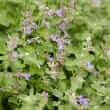Background
- Catnip (Nepeta cataria) is a perennial herb. In traditional use, catnip is believed to have sedative, carminative, and antispasmodic properties. As such, it has been used to treat insomnia, flatulence, and upset stomach. It has also been used traditionally to treat colds, the flu, and fevers. In Kazakhstan, Nepeta ucrainica L. has been traditionally used as an herbal tea.
- There is limited available scientific research on catnip. In vitro studies with the aqueous extract and with specific constituents suggest that catnip may have antibacterial, antiviral, and immunomodulatory properties. Early evidence suggests that the essential oil may act as an insect repellant. Aside from case reports, there is a lack scientific data available regarding catnip's alleged psychoactive properties.
- The U.S. Food and Drug Administration (FDA) does not list catnip on its Generally Recognized as Safe (GRAS) list.
References
Natural Standard developed the above evidence-based information based on a thorough systematic review of the available scientific articles. For comprehensive information about alternative and complementary therapies on the professional level, go to . Selected references are listed below.
- Abad, MJ, Guerra, JA, Bermejo, P, et al. Search for antiviral activity in higher plant extracts. Phytother Res 2000;14(8):604-607.
View Abstract - Akbay, P, Calis, I, Undeger, U, et al. In vitro immunomodulatory activity of verbascoside from Nepeta ucrainica L. Phytother Res 2002;16(6):593-595.
View Abstract - Baranauskiene, R, Venskutonis, RP, and Demyttenaere, JC. Sensory and instrumental evaluation of catnip (Nepeta cataria L.) aroma. J Agric Food Chem 6-18-2003;51(13):3840-3848.
View Abstract - Bernier, UR, Furman, KD, Kline, DL, et al. Comparison of contact and spatial repellency of catnip oil and N,N-diethyl-3-methylbenzamide (deet) against mosquitoes. J Med Entomol 2005;42(3):306-311.
View Abstract - Cauffield, JS and Forbes, HJ. Dietary supplements used in the treatment of depression, anxiety, and sleep disorders. Lippincotts Prim Care Pract 1999;3(3):290-304.
View Abstract - Chauhan, KR, Klun, JA, Debboun, M, et al. Feeding deterrent effects of catnip oil components compared with two synthetic amides against Aedes aegypti. J Med Entomol 2005;42(4):643-646.
View Abstract - Harney, JW, Barofsky, IM, and Leary, JD. Behavioral and toxicological studies of cyclopentanoid monoterpenes from Nepeta cataria. Lloydia 1978;41(4):367-374.
View Abstract - Jackson, B and Reed, A. Catnip and the alteration of consciousness. JAMA 2-17-1969;207(7):1349-1350.
View Abstract - Massoco, CO, Silva, MR, Gorniak, SL, et al. Behavioral effects of acute and long-term administration of catnip (Nepeta cataria) in mice. Vet Hum Toxicol 1995;37(6):530-533.
View Abstract - Nostro, A, Cannatelli, MA, Crisafi, G, et al. The effect of Nepeta cataria extract on adherence and enzyme production of Staphylococcus aureus. Int J Antimicrob.Agents 2001;18(6):583-585.
View Abstract - Osterhoudt, KC, Lee, SK, Callahan, JM, et al. Catnip and the alteration of human consciousness. Vet Hum Toxicol 1997;39(6):373-375.
View Abstract - Sherry, CJ and Hunter, PS. The effect of an ethanol extract of catnip (Nepeta cataria) on the behavior of the young chick. Experientia 2-15-1979;35(2):237-238.
View Abstract - Zhu, J, Zeng, X, Yanma, Liu, T, et al. Adult repellency and larvicidal activity of five plant essential oils against mosquitoes. J Am Mosq Control Assoc 2006;22(3):515-522.
View Abstract







